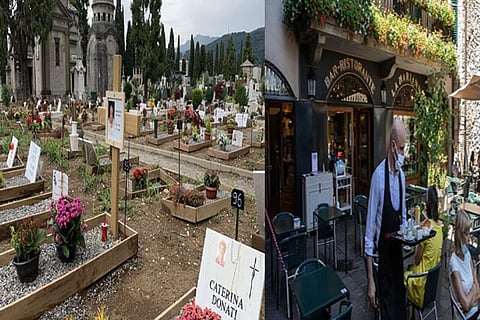

Chennai
“All of this was full of coffins; there were 132 of them here,” says Brother Marco Bergamelli, gesturing with outspread arms toward the interior of the chapel where pews have been set up once again. But most of the seats are still roped off and display warning signs — safety measures which probably aren’t even necessary, since many churchgoers haven’t dared to come back for services. A walk over to the main cemetery in Bergamo makes it very clear just how hard this region was hit by the coronavirus pandemic. Magnificent family tombs and mausoleums line the gravel paths, though one area not far from the entrance particularly strikes the eye: more than 100 simple, hastily made graves, edged by wooden boards. Most have no gravestone, the deceased identified only by a laminated note printed with a name.
“These are the graves of the coronavirus victims,” says Bergamelli. Of the more than 34,000 people who have so far died of COVID-19 in Italy, more than 16,000 came from Lombardy. Here in Bergamo, almost everyone has lost a relative or knows someone who has been infected by the virus.
The situation also pushed Bergamelli, 66, to his limits. After a countrywide lockdown was imposed on March 9, he was forced to look on as more and more coffins were stowed in his small chapel. The crematorium at the cemetery couldn’t cope with the numbers of dead. Bergamelli speaks of how the military came by every week to take 50 or 60 coffins away to crematoriums in Florence, Bologna or Ferrara, but that the caskets kept piling up in the chapel.
At first he held requiems for the dead, but it eventually became too much for him. “I started getting scared being in a room with all the coronavirus victims. After 10 days, it started to smell, and not just of the pines and firs in the cemetery,” he says. Today, graves are no longer dug on a daily basis. People in the city, which still bears visible signs of the pandemic, are trying to get used to the new realities of life. Masks must be worn everywhere — even when sitting with another person in a car. Cafes and restaurants have reopened, but are required to obey special hygiene regulations. Menus are thrown out after customers have ordered, and in many premises, guests’ temperatures are taken before they’re even allowed to take a seat.
Who bears responsibility?
Although many people want nothing more than to get back to their old lives, some just can’t go on as usual. One of them is Stefano Fusco, who founded the organization Noi Denunceremo (We Will Report) with his father. The group is demanding answers as to why so many people had to die in the region. Fusco himself lost his grandfather to COVID-19. The 85-year-old was being treated in hospital after a slight stroke when, during rehab, he came down with a fever and began to cough. He tested positive and died just a few days later.
Fusco says the situation was particularly distressing for his grandmother. The family had to inform her of her husband’s death by telephone and leave her alone with her grief, as she was in quarantine. Fusco and his father founded their group on Facebook shortly after his grandfather died, to help people who were at home alone coping with grief.
More than 60,000 people have since exchanged messages in the group. According to Fusco, most of their stories follow a similar pattern. “Many people died alone at home; many weren’t taken to hospital until they were almost dead. They could have been saved if they had been helped sooner,” he says. The public prosecutor’s office in Bergamo has now launched investigations with the backing of Noi Denunceremo. Fusco sees responsibility for the disaster as lying with the regional government, accusing it of reacting too slowly.
— This article has been provided by Deutsche Welle
Visit news.dtnext.in to explore our interactive epaper!
Download the DT Next app for more exciting features!
Click here for iOS
Click here for Android